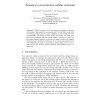Free Online Productivity Tools
i2Speak
i2Symbol
i2OCR
iTex2Img
iWeb2Print
iWeb2Shot
i2Type
iPdf2Split
iPdf2Merge
i2Bopomofo
i2Arabic
i2Style
i2Image
i2PDF
iLatex2Rtf
Sci2ools
84
Voted
MFCS
2009
Springer
2009
Springer
Bounds on Non-surjective Cellular Automata
Abstract. Cellular automata (CA) are discrete, homogeneous dynamical systems. Non-surjective one-dimensional CA have
nite words with no preimage (called orphans), pairs of dierent words starting and ending identically and having the same image (diamonds) and words with more/fewer preimages than the average number (unbalanced words). Using a linear algebra approach, we obtain new upper bounds on the lengths of the shortest such objects. In the case of an n-state, non-surjective CA with neighborhood range 2 our bounds are of the orders O(n2 ), O(n3/2 ) and O(n) for the shortest orphan, diamond and unbalanced word, respectively.
Homogeneous Dynamical Systems | MFCS 2009 | Non-surjective One-dimensional Ca | Theoretical Computer Science | Unbalanced Word |
Related Content
| Added | 27 May 2010 |
| Updated | 27 May 2010 |
| Type | Conference |
| Year | 2009 |
| Where | MFCS |
| Authors | Jarkko Kari, Pascal Vanier, Thomas Zeume |
Comments (0)

